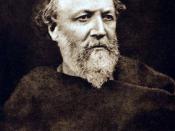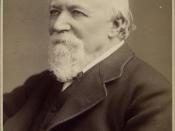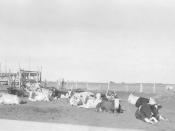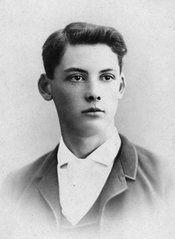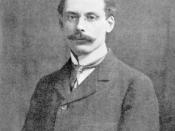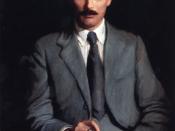Formal Critical study of ?My last Duchess? and ?Richard Cory? Despite the obvious dissimilarities in the setting and circumstances, the two poems, ?My last Duchess,? by Robert Browning, and ?Richard Cory,? by Edwin Arlington Robinson, are similar in that both works focus on a man?s rank in society. Showing the impact riches and power have on the life of a person and everyone around them.
?My last Duchess? begins in a second story villa, housing a duke?s art gallery in Ferrara Italy. The speaker of the poem is an Italian duke who ordered the murder of his wife and wishes to marry the count?s daughter. The count?s envoy has been sent to speak with the duke. Upon reaching a painting by Fra Pandolf, the duke begins to tell the envoy about the young lady in the painting. ?That?s my last Duchess painted on the wall, Looking as though she were alive.?
(751) Browning lets the reader know that the duke only shows the portrait of his late wife to few people. In doing so, the duke is able to show off his wealth. ?since none puts by the curtain I have drawn for you?? (752) This line indicates the duke doesn?t draw the curtain for just anyone, and the envoy should feel honored for the portrait can only be seen under the duke?s complete control. The duke believes he should be center of attention and shown the up most respect while in his home. The duke couldn?t stand the fact that the duchess treated everyone and every gift she received with equal value, ?as if she ranked my gift of a nine-hundred-years-old name With anybody?s gift.? (752) The duke thought of the duchess as a possession and he could never treat her as his equal. ?E?en then would be stooping; and I choose never to stoop.? (752) Since the duchess failed at pleasing her duke, her portrait hangs behind a curtain and the duke has complete control over it, just as he thought he should have had over his wife while she was alive.
There is an obvious connection between the duke?s art collection and his wife in this poem. For one, the portrait that the duke and the envoy are looking at is one of great beauty, done by a famous artist. He talks at great length about the physical beauty of the duchess, but when he describes her personality, he has very little kind words. This shows that all he ever wanted from his wife was to be beautiful and live her life as any noble woman should. She was not the kind of person to do so, however, so he immortalized her beauty so that after she was gone he could still posses the only aspect of his wife that he had every truly cared about. The most significant example of a connection between the duchess and the duke?s art collection is at the end of the poem when he tells his guest to ?Notice Neptune, though, Taming a sea - horse, thought a rarity, Which Claus of Innsbruck cast in bronze for me!? (753) This represents the relationship between the duke and his duchess in that he believes himself to be like a god and his wife a tiny helpless creature over which he has unquestionable power. The fact that the statue is cast in bronze is a symbol of the duke?s mentality that he is strong and immortal. Basically, the duke wants to display his power in general, as well as the control he had over his wife.
?Richard Cory? by Edwin Arlington Robinson is a prime example of the popular phrase ?misery loves company?. Richard Cory conveys the fact that riches and glittering things can?t bring glory and happiness into his life. Richard Cory would often walk the streets down town, always keeping to himself, however when he did talk to people he was a very polite and caring man. ?And he was always quietly arrayed, And he was always human when he talked.? (886) He was a very rich and knowledgeable man. Having an education finer than most. ?And he was rich- yes, yes richer than a king- And admirably schooled in every grace.? (886) Everyone around town admired Richard Cory, and wished to have the fortune and knowledge he had. ?In fine we thought that he was everything, To make us wish that we were in his place.? (886) Knowing they could never compare to Richard Cory, the town?s people kept working and continued their daily lives. ?So on we worked, and waited for the light, And went with out the meat and cursed the bread.? (886) While on one summer?s night, Richard Cory went home and unexpectedly shot himself in the head to relieve his misery from the world surrounding him. ?And Richard Cory, one calm summer night, Went home and put a bullet through his head.? (886) Richard Cory was a very rich man, and to the surprise of the town?s people he did not flaunt his money to impress nor did he act stuck up towards others, rather, he dressed and acted as a normal citizen. The Poem was dramatic in the sense that Richard Cory had something missing in his life, leaving it nothing but miserable for him, yet showing no one his pain leaving a false image of his true identity. Edwin Robinson wrote the poem to demonstrate that one might think someone is happy because they look happy, but the true question is, are they really happy? [1,008]
